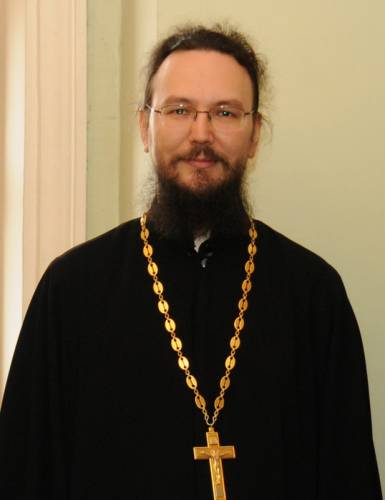Before the beginning of Great Lent, your friends made a solemn vow not to go on social networking sites until Pascha. Inspired by their example, you made the same promise. Yet in a couple of weeks you “encounter” first one of these friends, and then another, on the same site!
“What are you doing here?”
“I couldn’t stay away because of work. What about you?”
“Same thing.”
Sound familiar?
Do we control the Internet, or does the Internet control us? Are social networking sites and blogs dangerous, or are they just new and unfamiliar forms of communication? What do they offer us, and what do they take away from us? This is the theme of our discussion with the editor of the Internet portal Bogoslov.ru, Archpriest Paul Velikanov, Assistant Dean for Academic and Theological Studies at the Moscow Theological Academy, who holds the degree of Candidate of Theology. His dissertation was dedicated to the influence of technocratic civilization on the inner world of man.
Humanity’s Last Love
Father Paul, ten years ago, at the very beginning of the Internet age, we were frightened by a variety of dangers, the primary of which we called “creating the illusion of communication.” Have these fears been justified?
I think it goes without saying that the most radical of fears have not been justified, and I would certainly not want to exaggerate matters and begin this conversation by discussing how everything is just awful.
Nonetheless, the Internet has provided not only new opportunities, but also new challenges. Obviously, the more simple and accessible human communication becomes, the more superficial and less meaningful it becomes. We appreciate paper letters from our friends much more than text messages: we read them more attentively, since writing such letters involves an entire creative process. Even if you print out an email, it will not have that same flavor of uniqueness and exclusivity, of something made just for you. This is not a “thing” that can be shown to children decades later, carefully kept in a special place. Why not? First, emails are universal due to their global environment. Second, because we do not invest as much effort, labor, love, sacrifice, and attention as we would into an ordinary letter. A healthy, proper relationship between friends (and this also applies to the relationship between man and God) always involves the sacrifice of the most valuable thing we possess: time.
Of course, one could reach a profound conclusion from this about the degradation of cultural communication, but I think that would be an essential simplification of the issue. Today we are on the brink of a global “shift” in the very format of communication, and whence we are being “shifted” remains a very interesting question.
If we are talking about global challenges that can no longer be ignored – then this is, above all, chronophasia, the “devouring” of time, to which the Internet, television, and the entire entertainment industry contribute. If in times past St. John of the Ladder could speak of the belly as “wicked and amiable to all,” then today the same can be said of chronophasia: everyone sorely lacks time, but how fun and entertaining contemporary life is! Finding time for prayer has now become much more complicated; moreover, it is difficult to find time even for normal human contact.
It turns out that technology, supposedly designed to make life easier and to save time, actually deprives us of it…
The accessibility of so much technology has transformed human life into one large, multicolored mosaic. As we cling to the eyepiece of this kaleidoscope, turning the wheels with our fingers, we joyfully hope that some combination of colors will show us the recipe for happiness. It is unclear how such a tremendous number of trite, shallow, and by and large unnecessary events, news, items of knowledge, things, and even, dare I say, kind-of friends have suddenly appeared. And we have completely submerged ourselves into this space of “colored noise,” as I would call it. It is very difficult to discern any kind of melody in it. Yet at the same time, due to the very incessant nature of this colored noise, one feels that one is participating in life.
I know an elderly lady who has the TV turned on all day, even though she does not watch it. She needs this background noise. Without it she becomes anxious, even scared. The information we get from television creates a sense of belonging to society; it creates the illusion that everyone needs you, that you have not dropped out of society, that people remember you, that they are constantly telling you something. This is why elderly or lonely people often surround themselves with television noise. This is a kind of unconscious substitution for God. For someone who stands before God, this noise is disturbing. Yet for someone who does not pray, television is a comfortable replacement for prayer.
But give this lonely person at least some chance for real communication, let him feel that someone really cares about him, that someone needs him, and I am sure the need for such noise will vanish. No great labors are required for this; just visit him two or three times a week, sit with him for an hour and talk. Not even about anything spiritual, but just as with someone who has lived a long life, full of joys and sorrows. Now look at how this is a genuine sacrifice of love, one that cannot be substituted by a phone call, Skype, or Facebook.
So it turns out that, after all, this is not technology’s fault, but our own?
Yes and no. You know, in the case of the Internet another unexpected aspect arises: the problem of disembodiment. After all, God clothed man in corpulent flesh after the Fall, thus testifying to His paternal love for him, and not as “revenge” or “punishment.” Man, who had sinned, was clothed in “heavy” flesh, above all, so as not to turn into a demon. Paradoxically, thanks to the physical limitation of our bodies, we are slowed down on the way sin. Gluttony, for example, has physiological limits, one way or another. Our bodies act as brakes. But in the realm of virtual communication, on the contrary, the “disembodiment” of man occurs – and the brakes practically vanish. We find ourselves in some sort of semi-spiritual world, where the speed of thought is in fact comparable to that of communication in the world of ideas. Anyone who can type on a keyboard at breakneck speed no longer sees the physical barriers between thought, its verbalization, and its communication.
But, once again, we are having a conversation incriminating information technology, and this, I repeat, is only half the truth.
And the other half?
Technology in our world is often interpreted – for example, by St. Philaret (Drozdov) of Moscow – not only as a kind of “seal of sin,” but also as a manifestation of Divine mercy and care for us sinners. If not for technology, man would not be able to live in a changing environment. Where he was once king, commanding all of nature, from the moment of the Fall he became poor, naked, miserable, and wretched. He needed clothing, tools, and various means of survival – and God gives him every opportunity to acquire much more than the bare essentials.
That is, technology is both a seal of sin, and evidence of blessing.
Returning to our own times, one cannot but recall the words of Nikolai Berdyaev: technology is the last love of man, under the influence of which he is ready to change even his own image.
The Difficulty of Withdrawing from the Web
Internet addiction is a rather peculiar problem. How does it work?
Internet addiction is not always someone’s fault. For example, an invalid for whom the Web is his primary means of communication with the world is not to blame for his dependence on the Internet. But if we take a healthy person, it seems to me that in this case addiction arises primarily from the inadequacy of his real life. I have observed that when a person has a full, rich life, full of responsibility and care for his fellow men, then for him time spent on the Internet becomes a burden and punishment, not an entertainment at all. He would be just fine without virtual communication, but he is forced to bear this burden for the sake of those for whom the Internet or a cell phone are the only or simply the most convenient means of communication. And indeed, when we cease to respond to messages or phone calls, does this not show disrespect to those who need us? This is not a loving thing to do.
However, there is a category of people, and I am afraid that their numbers are increasing, for whom a virtual form of communication is a good way out from their life’s deficiencies, inner restraints, and personal complexes. Such a person opens up only in virtual communication. Social networking today is a sort of crutch for sinful man: you can lean on it, but you can also use it to whack another invalid on the head.
Virtual Candles and Confessions by Text Message
In your opinion, to what extent should the Church be represented in the new virtual landscape?
I think that for Christianity the task is not so much to adapt to modernity through technological innovations, but to use them to show Christ to this noisy society and to be a witness to Christ. If we are not capable of doing this, then no matter how many decibels we add to our shouting, it will not work – the other side will always out-shout us. What people expect from Christianity, above all, is a special quality of life, a quality that technological culture does not have: authenticity. This is what is desperately lacking in the modern world. If Christianity can demonstrate this authenticity, this means that it will have fulfilled its mission. If not, then this means it is not real Christianity.
What about “virtual chapels” and other elements of technology in divine worship? Why is the Church’s attitude so negative towards them?
In the conditions of technogenic civilization, the church building is the last bastion of humanness, the last fortress that has not surrendered. Due to the fact that the Church guards the imperishable truth about God, the world, and man, it is the main guarantor of humanness. I am always amazed by the moment in the movie “The Matrix” when Agent Smith says to Neo: “How I hate the smell of man!” The system, being a machine, “hates” our human unpredictability and uncontrollability. The church building literally breathes with this humanness. Crossing the threshold of a church, and being united with the Body and Blood of the God-Man, the faithful acquire an inner treasure that is in fact the “real me,” and not just another role in this protracted game called “life.”
In church there is a maximum degree of humanness, which is not subordinate to the mechanical laws of formal logic. The church is equally open to all: to both bums and the well-off, to both gangsters and monks. It is a place of paradoxes: everyone venerates the same icons, partakes of Holy Communion from the same chalice, even from the same spoon – it looks completely unsanitary! We are often frightened and made uncomfortable by this. But if we overcome these doubts, making a decisive step away from our usual fears, we will quickly come to the surprising realization that nothing bad will happen in this “unsanitary” place – and in fact nothing bad can happen! The uniqueness of the church building is that it offers a good dose of authenticity. For this reason alone its landscape should not be virtualized.
The minimization of technology also works for the benefit of otherworldliness. That is why it is so essential. A couple of years ago, an artist with a wild imagination suggested replacing the iconostas with huge plasma screens on which images of icons would be depicted, as well as to place screens with images of icons on analogians that would vary according on the feast day. God forbid we ever witness such a scene! The problem is not just blasphemy, an irreverent attitude towards icons, or a direct violation of the decrees of the Seventh Ecumenical Council – it is that it will be a real betrayal of authenticity. Such a church will not be a place of quiet and prayer. Notice how everything in both the divine services and in the interior of churches is conducive to seriousness in prayer, to self-restraint, and I would even go so far as to say – to severity. Rapidly changing images on screens are nothing more than simple tools for creating dreamy moods – which is unacceptable in man’s communion with God.
On the other hand, this by no means implies a global or absolute ban on the use of technology in the work of a clergyman. We have recently begun to develop software for mobile platforms that we jokingly call among ourselves the “iPriest.” This is a set of text, audio, and reference materials that can be useful to priests. It could help out in an emergency situation, when a priest does not have his liturgical books or does not have an experienced adviser. But I would immediately warn against the reckless use of even such seemingly innocuous applications. Any facilitation by means of technical inventions ultimately and invariably leads to the atrophy of the relevant skills. If you create, for example, a program that calculates all the algorithms of the order of divine services, thereby making redundant the weekly work of those who prepare the rubrics, this will lead to a situation in which nobody will give any thought to the beauty, wisdom, and love of man with which the seemingly formal Typikon is imbued. Or take another example: in Europe electronic church bells are used. As a result, unfortunately, the art of bell-ringing has been lost to the masses and is now restricted to small groups of professionals. Forbid people from ringing bells on Bright Week and you will immediately sense that they have been deprived of something very sincere and genuine, even if their bell-ringing is completely unprofessional.
The idea of online Confession has been especially criticized…
If I am not mistaken, St. John (Maximovich) in emergency cases heard Confessions by phone. Yet again the question arises: can this become the norm, and what is the criterion for the permissibility of such Confessions?
The point is that Confession, although being a distinct Mystery, traditionally is closely bound up with the divine services. Any priest will confirm that Confession at home and in church differ substantially. By going to church for Confession, we leave behind the small world we have created at home or at work and enter God’s territory. We pull ourselves out of the comfortable cocoon in which we are constantly surrounded. We allocate time to go to the divine service, forcing ourselves to overcome various obstacles, including shame before our father-confessors for our sins. Even waiting our turn for Confession is both painful and beautiful; it gives us time to focus our inner thoughts and to prepare to repent. All of this, ultimately, works for the spiritual benefit of each individual.
Here we return to the topic with which we began: what do people sacrifice in order to be with God? Every one of our visits to church is an attempt to break through this shell of comfort and complacency by creating a crack through which God can touch us. And this effort, I think, is no less important than the act of Confession. In part, these are very real fruits of repentance, which people bring to God to confirm the seriousness of their intentions to become better.
What is the fruit of repentance, and is it at all present when it comes to Confession over the phone? I do not know. In any case, the lack of “face to face” communication substantially impoverishes any conversation, especially when this concerns reaching into the furthest depths of one’s soul during Confession. In my opinion, unless it is absolutely necessary, Confession by telephone or mediated by any other technological means is unacceptable and harmful.
That is, simplicity and comfort are not the best companions to the spiritual life?
It is not always beneficial to simplify things. After all, by making something a person “makes” himself. By depriving him of the chance to participate in the making of something, leaving him simply to press the right buttons, we deny him the ability to change. Press a button and your sins are forgiven. Press a button and your money automatically transfers to the account of a church and a candle is “lit” on the website and burns for five minutes in some virtual landscape. Why? Do people even have the time to ask: To whom have I lit this candle? For whom does my heart yearn? Will I be able to look at the icons, silent before God?
Is it not the same situation with normal human communication? For example, gathering your friends in the evening at home rather than in a group on Facebook – is this not also a spiritual burden?
Undoubtedly. What is important is that technogenic culture stands in profound contradiction to the Christian attitude towards life, according to which we appreciate not what we receive, but rather what we give. Therefore, that which is most difficult to acquire is that which we value most. Christ says: For whosoever will save his life shall lose it; but whosoever shall lose his life for My sake and the Gospel’s, the same shall save it. When communication is so easy, is one really giving of oneself? Sending a message by means of a social network is easier than calling, and much easier than actually going there.
Jean Baudrillard, in his book The System of Objects, presents a brilliant analysis of contemporary society as one of simulacra – that is, of certain similarities, simulations, and “proclamations” of things – when in reality there is nothing behind it. If in ordinary life every sign means something (for example, a card shows my reverence, respect, and love for someone), in the society of simulacra each sign refers to something else, and this whirlwind never stops. For example, impersonal electronic greetings, which we can send to hundreds of our friends with a single click – what is this really? In reality I am just reminding these people of myself, providing evidence that I need them for some reason. It is a gesture and nothing else, but without any attempt from my side to use this greeting to deepen relations, to say something very warm, good, or inspirational, or to support someone – which can only be done directly. Relationships themselves become simulated and are actively supported and propagated by the appropriate interface.
Perhaps it would then be worth compiling “rules of contact for Christians on the Internet” in order to minimize these negative aspects, such as the imitation of the senses?
It seems to me that such rules should be, if you will, in a person’s “firmware.” No technology will ever change human nature for the better: this nature is fallen, passionate, and inclined towards sin. Therefore, the basic toolkit we should use to keep our souls from danger remains the same for the third century as for the twenty-third. I am against the creation of contrived, artificial, and external constraints. They should be born from within, by experience and the understanding of what separates us from Christ, of what destroys grace in the soul, and of what, by contrast, cultivates it. Nothing can relieve us of responsibility if we allow ourselves things on the Internet that are not permissible for a Christian in real, everyday life.
Probably the most important rule for anyone who is in the virtual landscape is that they should be aware that on the other side of the screen are real, living people, living souls, only more “exposed” and “uncovered” from the protective covers of the body.
Another very important rule of Internet communication is that no word should be noisy. By uttering many words we are simply increasing the total amount of noise. Noise is when words cost nothing, when they are not supported by the willingness to take responsibility for what one says, when one has neither real life experience nor an understanding of the given topic. This is just hot air, of which there is so much today. It is no wonder that Fr. Paisios of the Holy Mountain said that the world is tired of words. Words are no longer trusted…
We must fight against this lack of belief in authenticity – sometimes with words, and sometimes with silence.
Translated from the Russian.
You might also like
Commenting and Posting on the Internet During Lent


















